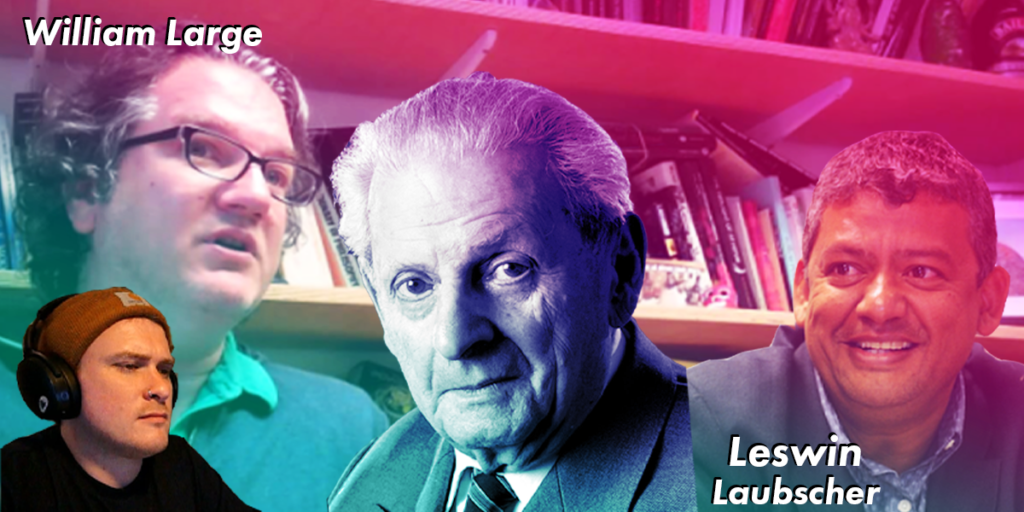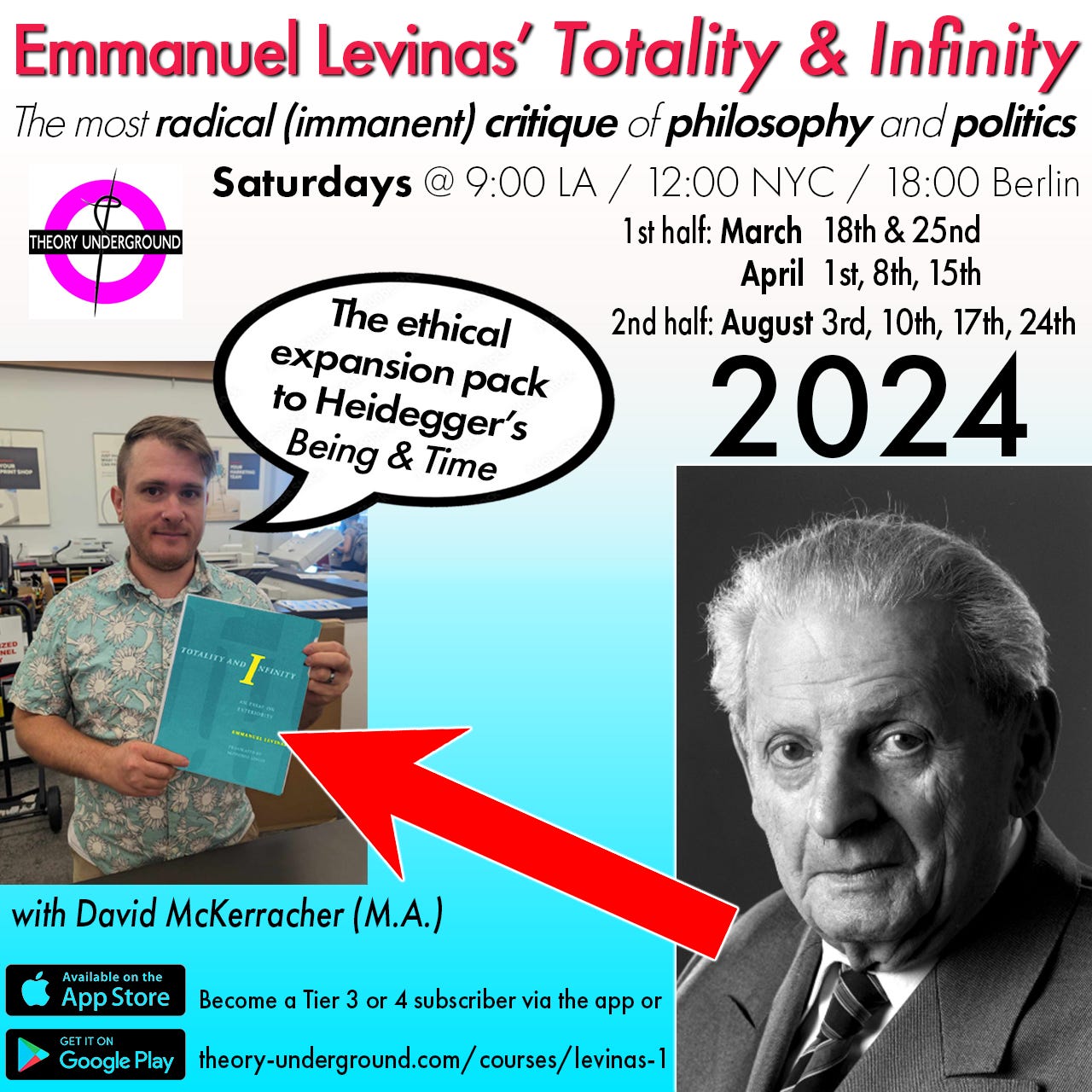William Large and Leswin Laubscher join for Levinas’ birthday!

What follows is a short bio on an essential philosopher, Emmanuel Levinas, followed by the logistics for tomorrow’s livestream interview with two very important guests who are joining me for Levinas’ birthday; I then share a passage on Levinas from my first book, Waypoint, followed by information about the course I am teaching on Levinas’ Totality and Infinity, beginning in March, 2024.
A short bio
Emmanuel Levinas is the “mysterious third” thinker for me. What I mean is that everyone already knows I’m the Heidegger and Marx guy, that timenergy theory comes out of a confrontation through, between, and beyond these two thinkers. Well, Levinas is someone I talk about rarely but think with all the time. He is my religious sort of mystic guy who prioritizes ethics over politics, but who refuses to make appeals to religious argumentation. Levinas bracketed everything transcendental and worked within the “phenomenological reduction” to immanently critique our most taken for granted assumptions.
I am going to share more essential background on Levinas down below, once I share the logistics for tomorrow’s event!
Levinas Birthday stream
Two amazing scholars join the channel for Emmanuel Levinas’ birthday!
Friday the 12th, David McKerracher interviews William Large of University of Gloucestershire, and Leswin Laubscher of Duquesne University.
Schedule:
9:30 AM LA / 10:30 PM Boise / 12:30 PM NYC / 5:30 PM London – William Large of University of Gloucestershire
- Dr. Large is the author of many books and articles, including Introduction two readers guides to books considered foundational and essential at Theory Underground: Levinas’ Totality and Infinity and Heidegger’s Being and Time.
11 AM LA / 12 PM Boise / 2 PM NYC – Leswin Laubscher of Duquesne University
- Dr. Laubscher is the author of many books and articles, including Introduction to Psychology as a Human Science and Emmanuel Levinas for Psychologists (2024).
Hope to see you there!
Essential info on Levinas
From my first book, Waypoint:
Emmanuel Levinas was deeply influenced by Heidegger’s Being and Time, attending his lectures a year after its publication in 1927. However, his admiration quickly soured when Heidegger joined the Nazi party in 1933. With the outbreak of the Second World War, Levinas, a French Jew, returned to France to fight for the allied forces. He was soon captured and spent the remainder of the war in a German P.O.W. camp. After the war, Heidegger never made a public apology for his participation in the party. Some speculate that his refusal to publicly disavow the Nazi party was due to his prioritization of “personal authenticity” over the opinions of the public.13
Levinas suspected that Heidegger’s focus on the all-encompassing nature of Being and individual freedom had eclipsed the possibility of his appreciation for the radical alterity14we experience when encountering others. Levinas’s phenomenological project thus turns Heidegger’s on its head. Whereas “the call of conscience” in Heidegger’s analysis is the individuating force of death anxiety that compels dasein to be true to its “ownmost possibilities” in spite of the They, the call of conscience for Levinas is the felt weight of responsibility instigated in the face of the Other15(where we understand “face” to be all human expression). His phenomenology founds everything else on this responsibility, which is why Levinas claims that ethics is first philosophy.
Levinas argues that our very freedom is conditioned by the Other. A self only emerges in the face of the Other, as it is in this encounter that it is naturally compelled to justify and therefore individuate its self (“apology,” in the Greek sense). This being addressed and having to account for itself reifies self-hood in developing self-reflection, character, language, rationality, conscience, and consciousness (which are inextricably entwined for the French, who have only one word for both: conscience). Conscience, therefore, owes its very being to the Other, which beckons it into the light of Being. This beckoning compels, leading to the naturally felt obligation to, on the one hand, justify one’s beliefs or actions to the Other, and also to be hospitable to others just as one desires to feel welcomed by the Other.
Our desire to be welcomed by the Other, which is no ordinary desire, only increases in proportion to its fulfillment. Levinas terms this “metaphysical Desire,” which he characterizes in one place as “genuine discourse.” Totalization renounces genuine discourse.16 For the possibility of the fulfillment of metaphysical desire, I must be open to the transcendence of the other that ruptures my totality by calling it into question.17
The responsibility to welcome, critique, and respond to the Other renders us vulnerable and can be exhausting. We therefore tend to retreat into the comforting and secure confines of our own totalized worlds. This act of totalization resembles the appropriative nature of our digestive processes, attempting to subsume that which is other to the same18 via knowledge acquisition.
We can never truly subsume the Other, yet conceptualization instigates the imperial delusion that we can grasp, acquire, and possess knowledge of those who are beyond oneself.19 There is a sense in which a concept of a mere thing surrenders said thing to our power. But a concept signifying an actual other person is necessarily deficient and misleading, as it cannot possibly contain that to whom it refers. A signifier cannot contain its signified. The signified other overflows conceptualization.
End of the section.
The above quote is from chapter II of Waypoint, which you can read or listen to at TU for free. Waypoint, the book, is available on Amazon.
Totality and Infinity COURSE offering at TU
Totality and Infinity is one of the most beautiful and difficult texts ever written. I have been wrestling with its ideas, interpretations, and prose for the better part of a decade. This year I am teaching it, beginning Saturday, March 18th, at 9 AM LA / Noon NYC / 18:00 Paris. We will take on the first half in five weeks, and then have a break before tackling the second half, which begins Saturday, August 3rd, at the same time.
You can enroll for this as a stand-alone course here, or become a Tier 3 or 4 subscriber (via the app or the site) to access all past, ongoing, and upcoming courses!



i’m happy that you guys are paying respect to Levinas! lol: when i used to be on fb, people made fun of me for it! they were like…uhm..uh..well uh…nobody really takes totality seriously anymore…do they..hmmmn. / i dont have to feel so bad now for being snneeered at ! 💜 🦓🕸the totality..
yes!
hahaha “nobody takes totality serious anymore” HAHAHA omg that’s the smoothest brain write off ever! As if “totality” only speaks of “meta narratives” or something. There’s so much more going on there!